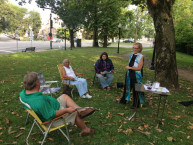 February 21, 2016: May God’s words alone be spoken, may God’s words alone be heard. Amen.
February 21, 2016: May God’s words alone be spoken, may God’s words alone be heard. Amen.
So last week, we heard about Jesus in the wilderness. He was beginning to live into his calling – a life that would lead him to Jerusalem – to the cross. After his baptism, he was ready to begin his journey in earnest, and don’t you know it, folks try to warn him off the path.
Jesus was moving from his private life to his public ministry. First he encounters his inner demons, or outer ones, in the desert. And now, the Pharisees, rather uncharacteristically (for the Gospels anyway), try to warn him about the dangerous path he was on, that Herod wanted to kill him. But, as frustrating as his work could be sometimes, Jesus knew what he was called to do and where he was called to go. Jerusalem and death awaited him, and he would not be rushed to it, or away from it, by the fears of others.
I think for most of us, the Pharisees of our lives, the inner demons and outer voices that often surround us, can leave us frozen in our tracks, stepping backward, or even changing course. We all have heard those voices at one time or another, right?
I am reminded of an old story about a man who had given much thought and prayer to what he should do with his life. Then, he had an epiphany – he knew exactly where he was to go, and what he was to do. He was so excited – it was a feeling he had never before experienced – a sense of purpose that had eluded him for so many years. He was filled with joy and anticipation.
And so he began on his journey, packing up and leaving home and village. Each time he thought about his goal, his heart beat quicker; and with each vision of what lay ahead, he found renewed vigor. As he walked along, he came to a bridge that crossed high above a dangerous river.
After starting across the bridge, he noticed someone coming the opposite direction. The stranger seemed to be coming toward him to greet him. As the stranger grew closer, the man could discern that they didn’t know each other, but yet he looked amazingly familiar, he even looked a bit like the stranger. Perhaps it was someone from his village, he thought. As they neared one another, the man could see that the stranger had a rope wrapped many times around his waist. If stretched out, the rope would reach a length of perhaps thirty feet.
The stranger began to unwrap the rope as he walked. Just as the two men were about to meet, the stranger said, “Pardon me, would you be so kind as to hold the end of the rope for me?” The man agreed without a thought, reached out, and took it. “Thank you,” said the stranger. He then added, “Two hands now, and remember, hold tight.”
At that point, the stranger jumped off the bridge.
The man on the bridge abruptly felt a strong pull from the now-extended rope. He automatically held tight and was almost dragged over the side of the bridge.
“What are you trying to do?” he shouted to the stranger below.
“Just hold tight,” said the stranger.
This is ridiculous, the man thought. He began trying to haul the other man in, but it was just beyond his strength to bring the other back to safety.
Again he yelled over the edge, “Why did you do this?”
“Remember,” said the other, “if you let go, I will be lost.”
“But I cannot pull you up,” the man cried.
“I am your responsibility,” said the other.
“I did not ask for it,” the man said.
“If you let go, I am lost,” repeated the stranger.
The man began to look around for help. No one was within sight. He began to think about his predicament. Here he was eagerly pursuing a unique opportunity, and now he was being sidetracked for who knows how long. Maybe I can tie the rope somewhere, he thought. He examined the bridge carefully, but there was no way to get rid of his new found burden.
So he again yelled over the edge, “What do you want?”
“Just your help,” came the answer.
“How can I help? I cannot pull you in, and there is no place to tie the rope while I find someone else who could help you.”
“Just keep hanging on,” replied the dangling man. “That will be enough.”
Fearing that his arms could not hold out much longer, he tied the rope around his waist. “Why did you do this?” he asked again. “Don’t you see what you have done? What possible purpose could you have in mind?”
“Just remember,” said the other, “my life is in your hands.”
Now the man was perplexed. He reasoned within himself, If I let go, all my life I will know that I let this other man die. If I stay, I will never continue on – my vision of my new life will be lost. Either way this will haunt me forever.
As time went by, still no one came. The man became keenly aware that he was losing strength – that if he didn’t resume his journey soon, he would never make it at all. Perhaps he might even be dragged over himself.
Finally, he devised a plan. “Listen,” he explained to the man hanging below, “I think I know how to save you.” He mapped out the idea. The stranger could climb back up by wrapping the rope around him. Loop by loop, the rope would become shorter.
But the dangling man had no interest in the idea.
“I don’t think I can hang on much longer,” warned the man on the bridge.
“You must try,” appealed the stranger. “If you fail, I die.”
Suddenly a new idea struck the man on the bridge. It was different and even alien to his normal way of thinking. “I want you to listen carefully,” he said, “because I mean what I am about to say.”
The dangling man indicated that he was listening.
“I will not accept the position of choice for your life, only for my own; I hereby give back the position of choice for your own life to you.”
“What do you mean?” the other asked, afraid.
“I mean, simply, it’s up to you. You decide which way this ends. I will become the counterweight. You do the pulling and bring yourself up. I will tug as well from here to help.” If we both work together, you will be saved. He then braced himself as best he could to be a counterweight. He was ready to help as soon as the dangling man began to act.
“You cannot mean what you say,” the other shrieked. “You would not be so selfish. I am your responsibility. What could be so important that you would let someone die? Do not do this to me.”
But, the man on the bridge refused to listen, and began to pull on the rope, and as he pulled, he realized that the one dangling from the rope had not moved. After a long pause, the man on the bridge sighed and uttered slowly, “I accept your choice.” In voicing those words, he stood up, unwound the rope from his waist, and let go to continue his journey.
The question is – would you let go of the rope?
You see, we encounter in our lives many types of ropes – well intentioned people who attempt to dissuade us from taking a certain path in life (like the Pharisees in the story – okay, so maybe they aren’t so well intentioned – but neither are those in our own lives all the time either). Or perhaps it is our own voice, our own fear, that keep us from moving forward. Remember in the story of the two men on the bridge – they looked alike. So, one might even ask – was there ever another person on that bridge other than the original man on his journey?
The rope that looks to bind us from going where God would lead us can come from within – in the form of doubt, fear, a sense of unworthiness, a feeling that it is more than we are capable of. And it can come from others – who fear losing their dependence on us, who are envious of our sense of direction and purpose, or perhaps are truly worried for us – caught up in their own fears – and wanting to protect us from all that they think might happen to us.
These fears grow most of all when we believe that it is all up to us – that we have to do everything ourselves – that we that we journey alone. And so, when we get to these moments on the bridge, we can feel dragged down by the weight of it all, like the man holding the rope – fearful of moving forward, or of staying put.
In the Gospel today, and last week, Jesus was having his own bridge moments. Knowing the difficulty of the life that lay ahead for him, he also knew what he was called to do, and for our sake, he continued on – despite those who would try to stop him.
And because he did, we know that while doubt and fear will always be a part of our very human journeys, we need never allow it to overtake us, because there is nothing in our lives that we do alone – God is always with us, the Holy Spirit is always calling to us to show us the path we are to walk, and Christ walks alongside of us – if we just take the next step forward – if we move across the bridges that connect our past and our future – if we place our trust in God.
Lent is a time of reflection, of pray, of turning to God (or returning to God – because that is what repentance is – turning back to God). It is a time to open our hearts to where the Holy Spirit is leading us, to the bridges we are called to cross, and to be mindful of the voices that we encounter along the way. Are they enabling us to move forward, giving us strength? Or are they, intentionally or not, placing a rope in our hands, and stopping us in our tracks.
And perhaps most important of all – when we look at that proverbial stranger on the bridge, are we looking in the mirror?
Lent is a journey – a most important journey across the bridge in our lives in Christ.
I pray we all walk it well.
Amen.
For the audio of the sermon from the 10:30am service, click here:
The Rev. Diana L. Wilcox
Christ Church in Bloomfield & Glen Ridge
February 21, 2016
Second Sunday of Lent – Year C
1st Reading – Genesis 15:1-12,17-18
Psalm 27
2nd Reading – Philippians 3:17-4:1
Gospel – Luke 13:31-35






